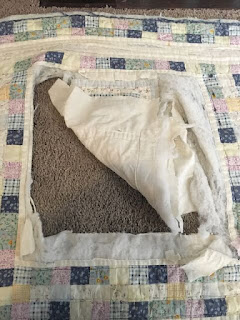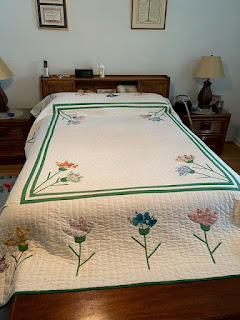Here comes some thinking and wondering that I've been doing lately.

Over the last few years, people have been asking me to repair soooo many really seriously damaged quilts from the 1960s-70s and onwards. For the most part, these are family heirlooms, made by beloved grandmas and great-grandmas.
I'm thinking that what I'm seeing are the quilts that have been used and loved and "used up" in the old-fashioned terminology.
Many are not fancy in pattern or workwomanship. Part of this is that in the 1950s-70s era, the making of super intricate quilts kind of drifted off. I've heard that put to the country's excitement about all sorts of new technological advances, and the exciting prospect of moving into a modern world and leaving the past behind. Another culprit is the advent of polyester batting which doesn't need nearly as much quilting.

I've also thought about fabric quality, which I think has been on a decline for several decades. I think it was in the 1990s or so when people started complaining about being able to see seam allowances through white and pale fabrics, which hadn't been the case before that. A friend of mine who's been quilting for ages, brought one of the quilts she made in the mid-70s to a show and tell in about 2018. She told us how she has used it lightly, stored it properly, and all that, and yet the fabrics are just pulling apart along the quilting lines...while sitting quietly in storage. And this was name brand fabric, not a thinner, discount store knock-off.
It's lovely to have people wanting to have the everyday kind of quilt to be saved. Quilt historians of today certainly would love to have more of those from
previous centuries (not just the "best" quilts, in other words) - but
the time to save them is before they are really damaged.
These fabrics get thin before they tear. That means that one more wash can end up making massive damage, all at once.
The cautionary tale here is that the time to start caring for family quilts is before you see the damage, not after. Fabrics are not as sturdy as furniture or paintings or china. Clothes that are worn and washed don't last past a handful or two of years. And quilts are made of the same kinds of fabrics as our clothing. Heirloom clothes like wedding dresses get special treatment, so should heirloom quilts.

I like to say that I can repair just about any quilt, given enough time and money. And I have repaired things that have come to me looking like a pile of rags. I'm happy to do so, because I value the family memories, too. But the other side of that coin is that the more work I do, the less it is the quilt that the ancestor made and the more it has a lot of me in it, too.
I have developed a way to support very tattered quilts. This neatens up the appearance and makes it safer to handle the quilt, but doesn’t actually repair the damage. This can still cost several hundreds of dollars. Some folks opt to have me do this to maintain the heirloom, and then also find someone to make a replica that can join the family and be displayed or used. This is basically having the best of both worlds.
Certainly, loving use is often what quilts were made for initially. But once the thought of saving one as an heirloom crosses your mind, that's the time to think about conservation, proper storage, and removal from use.
It's a personal choice of course, but I believe it should be a conscious choice between use and passing to the next generations. Sometimes, it's really not feasible to do both.
What's your opinion?














